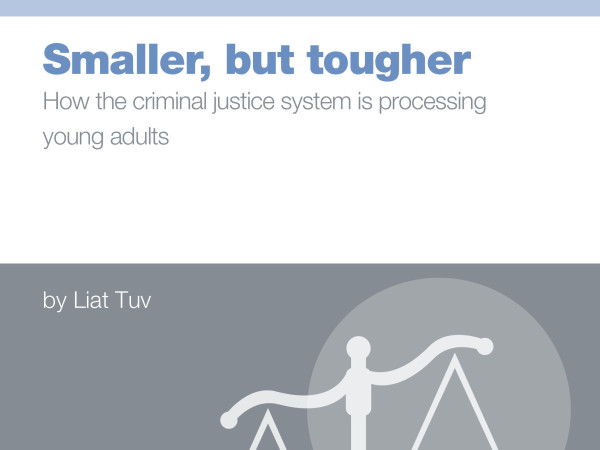
Fewer young adults are being sent to prison than a decade ago, but those who are imprisoned are getting much longer sentences.
Young women are more likely to held in pre-trial detention for offences that do not ultimately lead to a prison sentence than young men. Meanwhile, White young adults appear to be getting more lenient sentences than their Black counterparts.
These are some of the findings of a new report from the Centre for Crime and Justice Studies: Smaller, but tougher: How the criminal justice system is processing young adults. The report, based on detailed analysis of fifteen years of official data, paints a worrying picture that challenges claims that a ‘two-tier justice system’ is favouring Black and minority populations at the expense of White people. Instead, the report suggests that young women are being inappropriately detained, while Black defendants are facing tougher penalties than White defendants.
Among the key findings of the report:
- The number of young adults in court for more serious offences has decreased by 65 per cent over the last 15 years. The number of young adults sent to prison for those offences has decreased by 60 per cent over that same time period. Meanwhile, the number of young adults remanded in custody at Crown Court has decreased by 33 per cent.
- While those numbers have declined, those young adults who are prosecuted are more likely to be remanded to prison awaiting trial; are less likely to get a community sentence; and are more likely to go to prison, and for longer. The average sentence length for young adults (for more serious offences) in 2010 was about 16 months. By 2024 it was about two years.
- Over half of the young women (aged 18-20) in prison were there on remand while under half of the young men (aged 18-20) in prison were there on remand. Indeed, while young men are more likely to be remanded and more likely to get a prison sentence, young women are more likely to be remanded for offences that did not ultimately lead to a prison sentence.
- Ethnic disparities have also sharpened over time as the number of White young adults prosecuted has decreased at a faster rate than for other groups.
The report also found that, while ethnic disparities appear to be increasing, ethnicity data recording has worsened over time so it is hard to see the full picture. ‘Unknown’ ethnicity accounted for about seven per cent of the young adults proceeded against in 2010 and rose to account for about 37 per cent in 2024. This echoes one of the conclusions of the Baroness Casey’s recent review of group-based child sexual exploitation and abuse, which also found that the recording of ethnicity data was poor.
The report argues that the unreliable ethnicity data makes it harder to work out the trends for the smaller, marginalised groups within the criminal justice system, particularly young Black women, whose experiences and outcomes are not captured in the general trends.
Dr Liat Tuv, author of the report said:
“This is a worrying story, which superficially looks like a good news story. On the one hand, far fewer young adults are being prosecuted and criminalized than a decade and a half ago. On the other, the benefits of this fall in criminalisation are unevenly spread. Young Black men in particular are still over-represented throughout the system and marginalised young women are still not served by the official statistics, when their experiences and outcomes are already so often overlooked.
Administrative statistics can only show us a snapshot – one point in time, one stage of a process – but the general trends we can see in them do reflect disparities that academic studies and official reviews have pointed to for years.”
Annmarie Lewis, Head of Criminal Justice at Barrow Cadbury Trust said:
"This new report from CCJS endorses T2A’s current points of focus and provides us with up-to-date data to inform our work. We already know that the number of 18–24-year-olds going through the courts has fallen dramatically over the past 15 years. And we also know that those who do face prosecution are increasingly subject to harsher penalties. And although women have better outcomes than men on custodial sentencing, the report confirms that young adult women are more likely than young adult men to be remanded in custody but not convicted.
Meanwhile, young Black adults continue to be disproportionately represented at every stage of the system — from prosecution to sentencing — with young Black men over-represented in the prison population. T2A’s work for the coming 12 months will continue to reflect these concerns and disparities with reports like this providing a framework for talking to policymakers and practitioners".
We would like to acknowledge and thank the Transition to Adulthood Alliance, convened by the Barrow Cadbury Trust, which supported the production of this report.